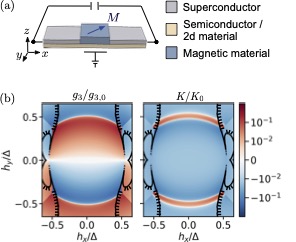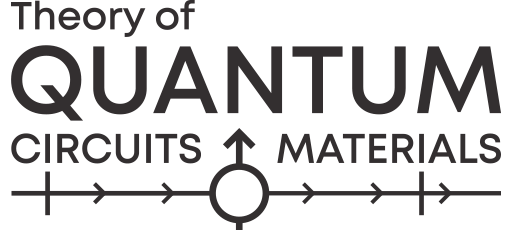Josephson junctions are central to superconducting quantum circuits, with their defining feature being the critical current at which transport changes from dissipationless to dissipative. Traditionally, this critical current has been perceived as being independent of the current-bias direction. However, recent results in the condensed matter community have shown that, when symmetry-broken quantum materials act as interconnects between superconducting leads, this seemingly foundational concept can be violated. Emerging from these findings is a new class of Josephson junctions, the “Josephson diodes“, where the critical current exhibits a distinct bias direction dependence. This prompts a question of both theoretical and applied relevance: Can these newly discovered Josephson diodes enhance the functionality and capabilities of superconducting quantum circuits?
Our research group is very interested in developing such quantum circuit applications of Josephson diodes and exploring novel material systems for their realization. A noteworthy result in this direction (obtained with collaborators at Cornell) is that Quantum Material Josephson Diodes offer a means for achieving dissipationless third-order nonlinearities. Such third-order nonlinearities are useful for superconducting amplifiers and could open to the way to a new generation of amplifiers without the need of external biases and with enormously simplified the circuit designs. Furthermore, Josephson diode-based amplifiers have the added advantage of improved power handling capabilities. This important feature is attributed to their ability to facilitate three-wave mixing without adverse an Kerr effect, which otherwise leads to gain compression of the amplifier at high input power levels.
We are very interested to continue pursuing this exciting direction. We have already identified several material systems that can support Josephson diodes, from superconductor-semiconductor Andreev interferometers to magnetic Josephson junctions. Our goal is to optimize these diodes for the aforementioned applications in amplifiers and also explore new applications of dissipationless nonlinearities for bosonic qubit encodings and tunable coupling architectures.
- Proposal for a realizing dissipationless nonlinearities with quantum material Josephson diodes [Link 1]
- Proposal for Josephson diodes with Andreev interferometers
- Proposal for Josephson diodes with EuS/Al/InAs hybrid Josephson junctions
- Observation of the Josephson diode effect in InAs/Al interferometers
- Observation of the Josephson diode effect in Germanium/Al interferometers

